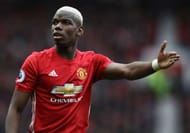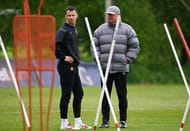It was a year that proved to be defining in the illustrious history of Manchester United, and while 2012 will be remembered as the year that Sir Alex Ferguson revealed to his employers that he would be stepping down at the end of the season, it also saw the departure of two of his most promising young players.
While the two stories are rarely connected, there is enough evidence in the annals of Ferguson's career to highlight his frustration at the circumstances that saw the pairing of Ravel Morrison and Paul Pogba depart Old Trafford, and how it would have played a part in his retirement thought process.
Pogba has since returned for a world-record transfer fee, and while he may not have yet lived up to the hype that surrounds such status, his opportunity for redemption would not have arisen under Ferguson. Meanwhile, Morrison remains a wayward soul, a wasted talent, an example that such prodigious ability is nothing without the dedication, desire and determination to succeed.
Sir Alex Ferguson ruled Manchester United for 26 years. He controlled every aspect of a club that grew to its current status during his tenure. When he arrived from Aberdeen in 1986, he could shape and manipulate every aspect of the club, it was his privilege as manager. It couldn't happen in the modern day. But as Ferguson grew, Untied grew, and he became part of the establishment as a result. Arsene Wenger holds a similar status at Arsenal.
Like Ferguson, Wenger has built his own empire and he will decide when to leave. But what makes the timing of Ferguson's exit interesting is the departure of Pogba and Morrison that same year. He had publicly spoken highly of the potential in the pair, and few empty words were leaked by Ferguson to the press.
He knew they were gifted, he knew that they had the potential to become great players for Manchester United and follow in the footsteps of the young players he had nurtured through the ranks in previous generations. But the difference this time was that he failed.
Fergie and the new world of football
And this should not be a considered a criticism, but a change in relevance, a change in respect, a change in the attitude of the highly-paid and highly-hyped young players with the world at their feet. The stories of Ferguson catching the likes of a teenage Ryan Giggs and Lee Sharpe hosting parties against his better advice have become part of Manchester United folklore, and his desire to see his young players settle down with the responsibility of a family was always all too evident.
For the sake of the reputation of Manchester United, he despised any controversy or unwanted media attention and grew increasingly frustrated as David Beckham walked the catwalks with his high-profile partner despite being at the height of his playing career.
As the years passed by, Ferguson stayed one step ahead of the modern game, but he lost touch with the modern world, and how it had shaped a new generation. By the time Ferguson announced his retirement, his era of strength, of control, had passed. He was no longer the father figure that this new generation fearfully respected, but was a figure that could be defied as new riches awaited elsewhere, regardless.
In previous years Ferguson would have controlled Pogba and Morrison in the same way that he had controlled Giggs and Sharpe, but the fact that he couldn't confirm to him that one of the main elements of his managerial method had finally expired. Of course, there are many other reasons why Ferguson retired, and he left with an outstanding reputation of succeeding and reinventing teams over an incredible tenure of consistent success.
There were personal and family reasons, but it is interesting to consider how the impact of losing a key part of his managerial skill set would have prompted him to bring his time in the dugout to an end.
All of the players that played under Ferguson during his managerial career have different stories to tell, but there is consistency when they talk of the fear-factor, the respect that he commanded, the overriding desire his players had to please him and not disappoint. He handled wayward stars, mavericks like Eric Cantona, but while his knowledge of the game remained relevant, the best of his man-management remained suited to an era that coincided with his prime.
The news age of managers and an even newer age of footballers
And now, handling the new generation of young players falls to the younger manager. Jose Mourinho has already experienced and dealt with one era in his managerial career, and the pain of dealing with this latest breed of badly-advised egotistic stars already appears to be taking its toll. Guardiola, Conte, Pochettino, Klopp and others are younger and more relevant to those who decide the results that will eventually dictate their success, but even their relevance will quickly drift.
What they all have in common is that they will have studied Ferguson's continued success, how he achieved consistent glory, how he continually reinvented his teams, strengthening in the right areas at the right time, and bringing nothing but the very best of those at his disposal. Player-power is a word that has become too common and too true in the modern game, and it may have played more of a part in Ferguson's retirement than he would care to accept, or admit.


